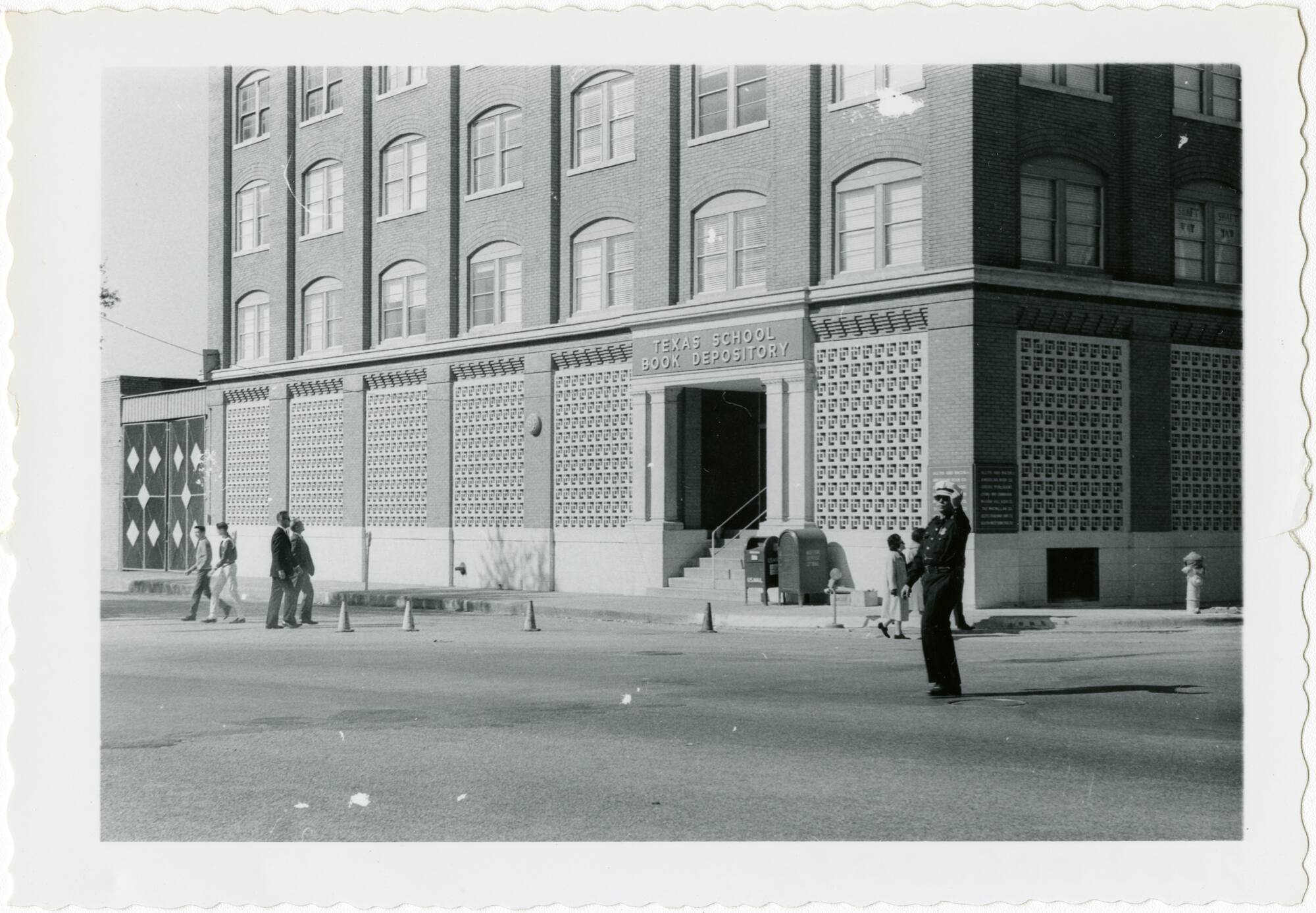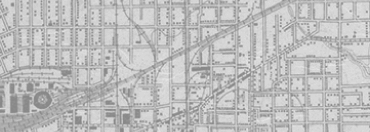


Back
Photograph of the exterior of the Texas School Book Depository building
Black and white photographic print of the exterior of the Texas School Book Depository building. The photo was taken in November 1963 by the Federal Bureau of Investigation as evidence in the days following the assassination of President Kennedy. The photograph shows the first three floors of the building including the building's sign and main entrance. The intersection of Elm and Houston Streets is in the foreground of the photograph with a police officer standing to the right side of the image. A row of traffic cones are visible on Elm Street in front of the entrance to the building.
Photograph of the exterior of the Texas School Book Depository building
November 1963
Paper
3 1/2 x 5 in. (8.9 x 12.7 cm)
Nat Pinkston Collection/The Sixth Floor Museum at Dealey Plaza
2003.006.0032
This FBI photographic print was in the personal collection of retired agent Nat A. Pinkston (1915-2011). Pinkston was a Dallas attorney prior to joining the Federal Bureau of Investigation. He retired from the Dallas FBI office in 1967 after twenty-eight years of service. Pinkston was involved in the local assassination investigation, notably tracing ownership of the Mannlicher-Carcano found in the Depository to employee Lee Harvey Oswald. He was also dispatched to the Texas School Book Depository on December 2, 1963, after Lee Harvey Oswald's clipboard was discovered in the northwest corner of the sixth floor near where the rifle had been found shortly after the assassination. -- Stephen Fagin, Curator
This FBI photo clearly shows the breeze block walls that covered the ground floor window bays of the Texas School Book Depository in 1963. Comprised of patterned nonstructural concrete blocks, breeze block walls were popular midcentury architectural design elements. Both decorative and functional, the blocks provided shade and circulation for buildings without air conditioning. John Sexton and Company grocery wholesalers added breeze blocks to the exterior of the warehouse in the 1950s. They remained in place until Dallas County renovations in the late 1970s returned the building's exterior to its original 1901 appearance. -- Stephen Fagin, Curator

Photograph of the exterior of the Texas School Book Depository building
Black and white photographic print of the exterior of the Texas School Book Depository building. The photo was taken in November 1963 by the Federal Bureau of Investigation as evidence in the days following the assassination of President Kennedy. The photograph shows the first three floors of the building including the building's sign and main entrance. The intersection of Elm and Houston Streets is in the foreground of the photograph with a police officer standing to the right side of the image. A row of traffic cones are visible on Elm Street in front of the entrance to the building.
Photograph of the exterior of the Texas School Book Depository building
November 1963
Elm Street
Houston Street
Photographs
Investigations
Evidence
Windows
Sign
Pinkston, Nat A.
Texas School Book Depository
Federal Bureau of Investigation
Dallas
Paper
3 1/2 x 5 in. (8.9 x 12.7 cm)
Nat Pinkston Collection/The Sixth Floor Museum at Dealey Plaza
2003.006.0032
This FBI photographic print was in the personal collection of retired agent Nat A. Pinkston (1915-2011). Pinkston was a Dallas attorney prior to joining the Federal Bureau of Investigation. He retired from the Dallas FBI office in 1967 after twenty-eight years of service. Pinkston was involved in the local assassination investigation, notably tracing ownership of the Mannlicher-Carcano found in the Depository to employee Lee Harvey Oswald. He was also dispatched to the Texas School Book Depository on December 2, 1963, after Lee Harvey Oswald's clipboard was discovered in the northwest corner of the sixth floor near where the rifle had been found shortly after the assassination. -- Stephen Fagin, Curator
This FBI photo clearly shows the breeze block walls that covered the ground floor window bays of the Texas School Book Depository in 1963. Comprised of patterned nonstructural concrete blocks, breeze block walls were popular midcentury architectural design elements. Both decorative and functional, the blocks provided shade and circulation for buildings without air conditioning. John Sexton and Company grocery wholesalers added breeze blocks to the exterior of the warehouse in the 1950s. They remained in place until Dallas County renovations in the late 1970s returned the building's exterior to its original 1901 appearance. -- Stephen Fagin, Curator









